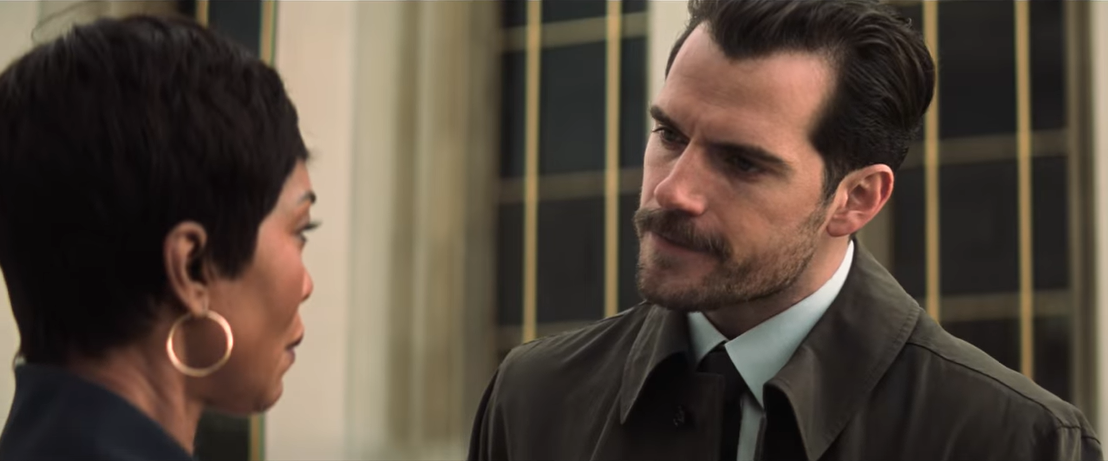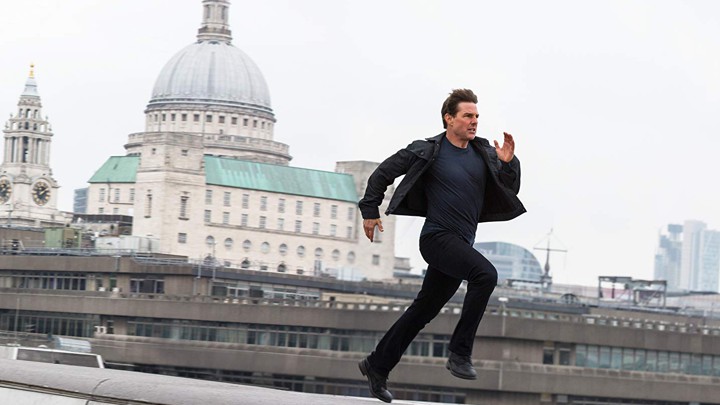
Cut off one head, and two more take its place. Maybe not two, but one considerably stronger than the first. IMF agent Ethan Hunt (Tom Cruise) thought he took out the head by taking down Solomon Lang (Sean Harris) and his Syndicate. In his absence, another organization has risen; known only as “Apostles.” This group isn’t carrying out the mission of Christ. Instead, they’re messengers of chaos, releasing pestilence into the world in an effort to reshape it. Their creed? “There cannot be peace without first a great suffering. The greater the suffering, the greater the peace.”
And yet, their final phase hasn’t been delivered. The only people who have a chance at stopping it from deploying make up the IMF. But after a botched mission in Berlin, the CIA intervenes and places one of their own into the fray in August Walker (Henry Cavill). The tensions run high, and old friends and new foes consistently pop up to complicate the mission. If the mission is failed, the fallout will be paramount.

As far as franchises finding a second wind deep into their lifespans go, only The Fast and the Furious and Mission: Impossible can lay claim. But whereas the Dom Toretto and co. hijinks pivoted into…well…the impossible around Fast Five (the best of that series) and fully in Fast & Furious 6, Ethan Hunt and co. have ramped up the thrills without wholly sacrificing realism. It’s a balancing act between being a crowd-pleaser and a tense spy thriller, one that MI has gotten close to in recent films but not quite nailed down—until now with Mission: Impossible-Fallout.
One of the calling cards of the Mission: Impossible series is the fact that each movie has had a different directorial vision. From Brian De Palma to John Woo to J.J. Abrams to Brad Bird to Christopher McQuarrie, every feature has offered a different tweak to the M:I formula; some for better, some for worse. With the success of Rogue Nation, though, what would be the rationale in getting rid of a good thing in jettisoning McQuarrie? By having McQuarie return to write and direct, Mission: Impossible-Fallout sports the tightest plot in the 22 year history of the franchise.

There’s no fat in Fallout. The mission undertaken is laser-focused in its clarity; feeling more like “A-B-C” storytelling opposed to “A-C-B-D-F-E-G” backtracking or “fetch this to get that” storytelling. McQuarrie’s story starts strong and ends even stronger, an escalating exercise in exquisite pacing. Literally everything from the set pieces to the plot twists are released at the right time. The writer/director’s return builds on—or rather, reveals—an emotional heart that probably was always present in M:I but never utilized, perhaps due to the ever-changing director situation.
There are the common spy tropes, but Fallout‘s script asks a compelling moral question: If posed with saving the life of a close friend or the lives of thousands who are unknown, why wouldn’t we choose the close friend? Does that make a person weak and selfish or strong and loyal? It’s a question that provides a through line from beginning to end. Above all, Fallout is gripping from the word go, with a tremendous score from composer Lorne Balfe in what likely stands as his best career work to date. If there were one minuscule issue, McQuarrie’s writing falls to the same problem that can occasionally mar Marvel movies. Fallout has solid humor, but at times, where it is placed undercuts a serious moment or two.
What’s never undercut is the action, even a little. Early buzz had hailed this movie as the best action movie since Mad Max: Fury Road. While “action movie” could include a lot of movies, the claim is valid if solely focusing on summer/big scale features. Fallout is simply exhilarating, well beyond the money scenes of destruction and madness. Hell, the absolute best moment in a blockbuster full of them is a semi-small one, seeing Cruise channel his inner Usain Bolt in a never-ending sprint down all nooks, crannies, and bridges of London to close the distance on his target. It’s an wide and atmospheric shot that captures the magnitude of it all, and the technique is used consistently throughout.

When your lead superstar is willing to put his entire body on the line to sell a scene, McQuarrie and cinematographer Rob Hardy can afford to be practical and honest in what they show. Once again Cruise—at the tender age of 56 (yet barely aging in 22 years)—shies away from nothing, always and forever a movie star, carrying a zeal that is ever-present. The entire returning cast is strong in their work, whether it’s Simon Pegg and Ving Rhames bringing levity when (mostly) needed, Rebecca Ferguson’s Elsa evolving more as a character, or Harris using his method acting to surpass what he did before as the villainous mastermind Lang. But bit players, like Alec Baldwin’s Secretary, Vanessa Kirby’s femme fatale Black Widow, and especially Angela Bassett’s CIA Director, steal scenes in limited screen-time. Lastly, the talking point coming out of Fallout is likely to be Cavill, the burly and oft-rigid Englishman perfectly cast as a blunt force hammer to Cruise’s precision scalpel.
It’s legitimately impossible to envision there being another rung in quality that the M:I series could reach after Mission: Impossible-Fallout. Nevertheless, as long as Cruise and McQuarrie are on board, it’s a mission I wouldn’t mind seeing them choose to take.
A-
Photo credits go to theatlantic.com, joblo.com, and IGN.com.
Follow me @Markjacksonisms/@MovieManJackson

Seeing it in t-minus 1 Hour!!!!!!
Interested to see your thoughts!
Loved the movie, and this is a great review .. agree with you about the timing of those moments of humour though. Overall: top quality action, exactly how the genre should be.
Best blockbuster of the year, top 5 for me overall!